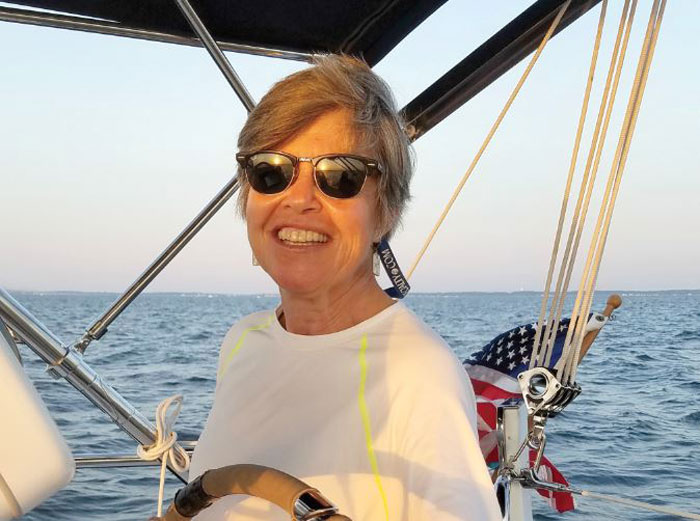I struggled to cross the line three times before Rover, my Nordic 34, made it over. I’d motor-sailed to windward in 25-knot winds from Annapolis to Thomas Point with a double-reefed main, leaving plenty of time to arrive early for the start. But I hadn’t practiced short-tacking with a reefed jib before the horn, or flag, or whatever it was I was anticipating (I don’t race much and couldn’t always keep track of the committee boat) to position myself to cross the line anywhere near start time. Sometimes I sailed backward just to gain the speed to get the bow through the wind and waves.

I don’t know what motivated me to race single-handed. However, my family reminds me repeatedly that I was adamant about wanting to do things myself as a toddler (and evidently thereafter). I sail single-handed more out of necessity—for example, when I can’t gather crew for one of my spur-of-the-moment jaunts—than an earnest need to keep my own company. I know all my own jokes and no longer find them amusing. I signed up for the Chesapeake Bay Shorthanded Sailing Society (CHESSS) West River Sailing Club (WRSC) Shorthand Classic regardless. The challenge allured me. I’d never raced single-handed.
Autopilots are permitted under CHESSS rules. Lending a hand is beneath my autopilot’s dignity. I must coax it into submission by tying down the clutch with a bungee cord to keep it from committing auto-disconnection from the wheel. Its control head wanders like my own. It sounds like a Tasmanian devil with strep throat, so I use it only when I need to go forward to raise and lower sail and when I need to go below to use the head, which is tantamount to a medical emergency at sea. (There ought to be a Coast Guard day shape for the equivalent of “Beware of Dog.”) The vessel was still under command, but her captain was below, wedging herself in the head and crossing her fingers that Rover would avoid collision on her own. “Restricted in Ability to Maneuver” describes my situation absolutely.
Once I’d overtaken my first boat in my Jib and Main (JAM) class, frustration gave way to relief, tentatively at first, and then in earnest as all that tacking back and forth gave way to a long windward leg down to 84A. I spat out the pulverized bone that had before been my clenched jaw. But when that boat withdrew from the race a short time later, I reassessed my resolve to finish the race. Self-doubt seeped in, but I was too stubborn to bail out. I needed this challenge—wind, waves, and anxiety—as a test of my ability to handle heavy weather alone on the Bay and off shore.
Winds were gusting to 30 knots, rain fell, and Rover dove through waves, taking water over the bow and causing the anchor to jangle. One of those waves had ejected my Danbuoy overboard, and I’d radioed a “securite” to alert others. My new fear then was losing the anchor off the bow roller and having to watch it punch holes in my hull. Irrespective of the fear, I did not leave the helm as I should have to creep forward and check that the anchor was properly secured. I failed that part of the test.
That left one more boat for me to catch, Red Sky, the smallest boat in the fleet. Rover was in a groove by then, and I bounced by the double-handed C&C shy of 84A. My arms ached from trimming sheets. I was wet and cold. Fear of tacking kept me from rounding close to the mark; I didn’t want to have to tack again if I found I couldn’t make it the first time. Over-staying that mark, my inelegant start, and just missing being run over by the NOOD Regatta fleets under spinnaker at my leeward mark set me back just enough to take second place (out of two boats that finished the race).
The wind had turned westerly, forcing me to short tack up the West River all the way to the finish line at Pirates Cove. Rain fell again as I passed the race committee. A sense of accomplishment and relief sank in as did the anchor, when I dropped it (intentionally). Friends of mine in three boats had anchored in the cove, and I was touched by their support. When single-handing, it helps to know you’re not going it alone.
by Lauren Anthone




